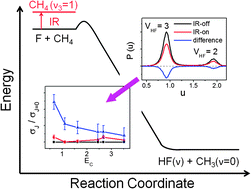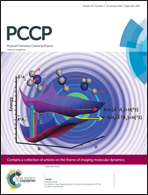On the signal depletion induced by stretching excitation of methane in the reaction with the F atom
Abstract
Exciting a stretching mode of a chemical bond should help its breaking during a chemical reaction, according to conventional wisdom. In several recent studies of the reactions of stretch-excited methane (and isotopologues) with the F atom, counterintuitively, we found that the induced reactant vibrations instead inhibit the bond rupture and slow down the overall reaction rate. This intriguing observation has been qualitatively ascribed to the vibrationally induced steric effects of the reaction in previous reports. However, quantitative determination of the reactivity suppression in terms of reaction cross sections remains lacking. In this report, we scrutinize the physical meaning of this (product) signal depletion phenomenon and fill the gap. Through a systematic investigation we further elucidate the additional reaction dynamics information that can be retrieved from the depletion measurements. The resultant rotationally state-selected reaction cross sections for both the vibrational ground and excited states are presented, and the stereodynamical implications are delineated.

- This article is part of the themed collection: Imaging molecular dynamics

 Please wait while we load your content...
Please wait while we load your content...